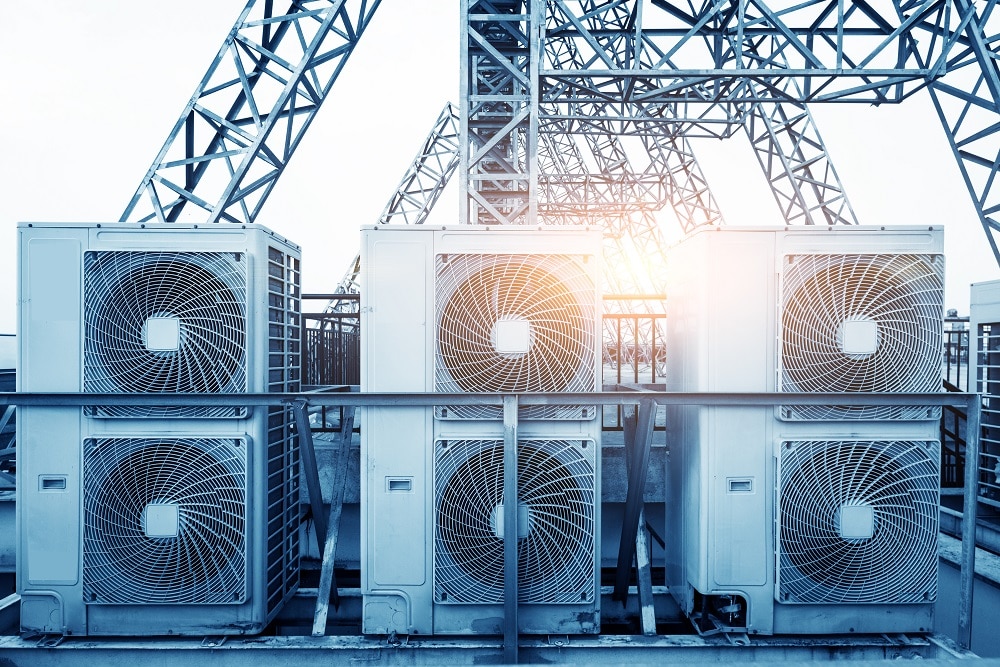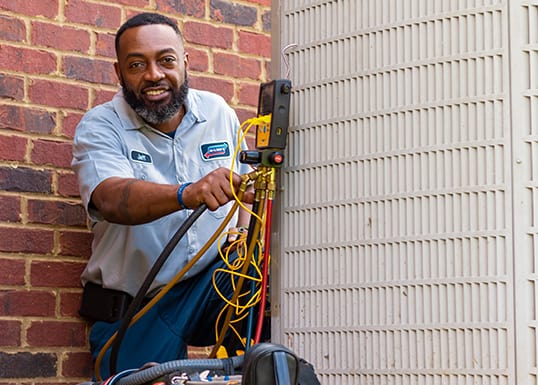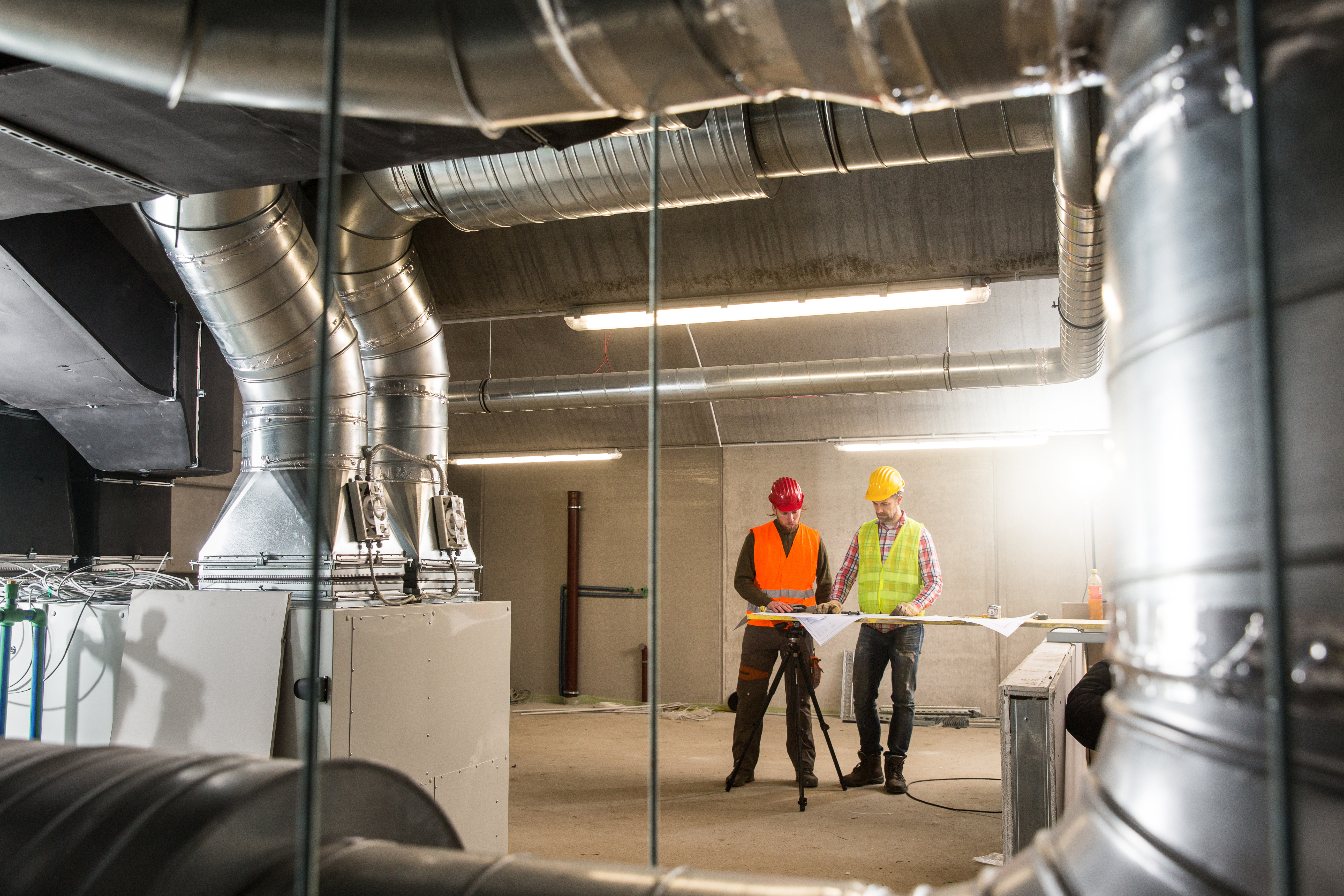Just How a Reliable Heating And Cooling System Boosts Indoor Air High Quality and Convenience
A trusted heating and cooling system is important for keeping interior air quality and convenience. It controls temperature level and humidity, creating a much healthier living atmosphere. Efficient air purification eliminates pollutants and irritants, while proper moisture levels stop mold and mildew development. Normal upkeep guarantees peak efficiency, improving system effectiveness. Understanding these components discloses just how they engage to produce a fresh atmosphere. The connection between Cooling and heating systems and overall health goes deeper than one might anticipate.
Recognizing the Essentials of Heating And Cooling Equipments
Heating and cooling systems, essential for contemporary comfort, include ventilation, air, and heating conditioning parts that work together to manage interior environments. These systems are developed to keep perfect temperatures, guaranteeing that rooms continue to be comfortable no matter exterior weather conditions. Burner, such as furnaces or heatpump, provide heat during colder months, while cooling units cool down spaces when temperatures climb.
Air flow plays a crucial function, helping with the circulation of fresh air and removing stagnant air, which assists in maintaining a well balanced atmosphere. Numerous sorts of a/c systems exist, including streamlined and decentralized setups, each suited for various building dimensions and objectives. Additionally, modern-day advancements have introduced clever modern technologies, enabling for improved control over interior climate. Comprehending these principles makes it possible for customers to appreciate exactly how a/c systems add to overall well-being and convenience in business and residential spaces alike, laying the groundwork for discussions on their influence on interior air high quality.
The Function of Air Purification in Indoor Air High Quality
A notable facet of keeping interior air quality works air filtration, which plays a vital duty in eliminating contaminants and irritants from the setting. Heating and cooling systems geared up with high-grade filters can record a range of pollutants, consisting of dust, plant pollen, pet dander, and mold and mildew spores. This filtration procedure greatly minimizes the focus of air-borne particles, leading to a cleaner and much healthier indoor atmosphere.
Furthermore, routine upkeep of air filters is important to ensure peak efficiency. Clogged or unclean filters can hinder air movement, lowering the system's performance and possibly allowing pollutants to flow within the space. By replacing or cleansing filters as suggested, homeowners can improve their cooling and heating system's capability to offer fresh air.
Moisture Control and Its Influence On Comfort
While lots of might concentrate on temperature level law, moisture control is equally important for keeping comfort in indoor settings. High humidity levels can lead to discomfort, making areas really feel warmer than they actually are, while low moisture can cause dry skin, irritation, and boosted sensitivity to respiratory issues. A reliable HVAC system plays a significant role in managing interior humidity, making certain that air is neither too moist neither also completely dry.
Optimum moisture degrees normally range from 30% to 50%, advertising a comfortable environment. When moisture is well-regulated, residents experience enhanced thermal convenience, boosted interior air quality, and minimized threats of mold and mildew growth and allergen expansion. Moreover, proper humidity control can safeguard furnishings and structural elements from damages triggered by extreme dampness or dry skin. Subsequently, incorporating reliable moisture management right into cooling and heating systems is crucial for fostering a pleasurable and healthy and balanced indoor atmosphere helpful to health and efficiency.
The Value of Normal Maintenance
Normal maintenance of heating and cooling systems is vital for guaranteeing peak performance and long life. This aggressive method not only decreases possible failures but additionally improves power efficiency, which can result in significant cost financial savings in time. Set up evaluations enable specialists to recognize and attend to concerns prior to they rise right into costly repair work, making sure the system operates efficiently.
In addition, routine maintenance involves cleansing or replacing filters, examining cooling agent levels, and checking air ducts, every one of which add to ideal airflow and click here system effectiveness. By keeping the heating and cooling system, home owners can also prevent too much wear and tear on components, prolonging the general lifespan of the system.
In addition, a well-kept heating and cooling system operates silently and safely, minimizing the risk of harmful circumstances. In verdict, regular upkeep is a vital investment in both the performance of cooling and heating systems and the comfort of interior atmospheres, inevitably promoting a healthier living space.

Exactly How Cooling And Heating Equipment Reduce Allergens and Pollutants
Efficient a/c systems play a necessary function in minimizing allergens and pollutants within interior atmospheres, therefore improving overall air top quality. These systems utilize advanced filtering innovations that capture dirt, pollen, mold spores, and family pet dander, avoiding them from distributing throughout the space. High-efficiency particle air (HEPA) filters are especially efficient, capturing as much as 99.97% of fragments as tiny as 0.3 microns.

Power Efficiency and Its Advantages for Health
Energy-efficient a/c systems not just minimize energy intake yet additionally have significant wellness advantages for occupants. By optimizing energy use, these systems can keep constant interior temperatures, which helps prevent the development of mold and mold. Controlling moisture levels is necessary for respiratory health, as excess wetness can aggravate allergies and bronchial asthma. Additionally, energy-efficient systems typically incorporate innovative filtration modern technologies that enhance air top quality by eliminating air-borne fragments and contaminants, even more boosting overall wellness.
Lower power usage implies reduced exhausts from power plants, adding to cleaner exterior air top quality, which indirectly sustains the health of homeowners. With an emphasis on sustainability, energy-efficient HVAC systems promote a much healthier living setting. By purchasing such systems, home owners not just minimize energy expenses but also make a significant commitment to the health and wellness of their family members and areas. Inevitably, power effectiveness in a/c systems promotes a much healthier indoor ambience for all.
Enhancing Convenience Via Smart Modern Technology Assimilation
As smart innovation remains to advance, its combination into a/c systems substantially boosts interior convenience. Smart thermostats, for circumstances, permit individuals to personalize heating and cooling routines based upon their everyday regimens, making certain suitable temperature levels when individuals are home. These tools can discover preferences with time, readjusting setups instantly for optimum comfort.
Wise sensors check interior air high quality and moisture levels, supplying real-time feedback that aids keep a healthy atmosphere. By communicating with a/c systems, these sensors can prompt changes to airflow and temperature, guaranteeing regular comfort.
Mobile applications additional encourage customers, allowing remote of HVAC settings from anywhere, consequently supplying convenience and versatility.
Regularly Asked Concerns

How Can I Inform if My HVAC System Is Efficient?
To determine a/c efficiency, one can check energy expenses for anomalies, inspect for uncommon sounds, screen temperature level uniformity, warranty appropriate air flow, and timetable normal maintenance. These variables collectively indicate the system's functional efficiency and performance.
What Indicators Show Poor Indoor Air Quality?
Signs of bad interior air top quality include relentless smells, excessive dirt accumulation, enhanced allergy symptoms, noticeable mold growth, and varying moisture levels. These indications commonly recommend that ventilation or air filtration systems may be defective or inadequate.
Can a HVAC System Assist With Pet Dog Dander?

Just how Often Should I Replace My Air Filters?
Air filters must typically be changed every 1 to 3 months, depending on usage and indoor air quality. HVAC experts. Routine replacement aids maintain reliable airflow and decreases dirt, irritants, and various other particles in the home atmosphere
What Are the Costs of Cooling And Heating System Installation?
The expenses of heating and cooling system installation typically vary from $3,000 to $7,000, relying on aspects such as system type, home size, and local labor prices. Extra functions may boost total expenditures substantially.
A reliable A/c system is necessary for preserving interior air high quality and comfort. HVAC systems, essential for contemporary comfort, encompass air, heating, and ventilation conditioning elements that work with each other to regulate interior settings. Effective Cooling and heating systems play a crucial role in lowering irritants and contaminants within indoor settings, consequently improving overall air top quality. A Heating and cooling system can significantly minimize family pet dander by using advanced filtering systems and normal upkeep (HVAC experts). The prices of HVAC system installation typically vary from $3,000 to $7,000, depending on variables such as system type, home dimension, and regional labor prices